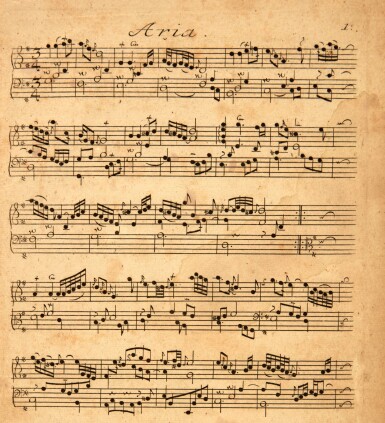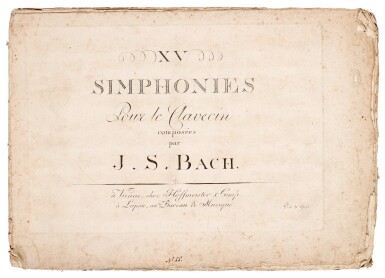Johann Sebastian Bach
Passionsmusik von Johann Sebastian Bach nach dem Evangelium Matthäi Cap.26 und 27, Berlin:J.G. Brüschke, 1829
FIRST EDITION OF THE LIBRETTO OF THE ST. MATTHEW PASSION, BWV 244, with Zelter’s Preface, 28 pages, 8vo (17.7 x 11.1cm), type-set text, some old pencil annotations, contemporary marbled paper backstrip, dust-staining to title, some scattered spotting
The important role of Mendelssohn in the revival of Bach’s St Matthew Passion is underlined by Carl Friedrich Zelter, who writes in the Preface:
...Endlich danken wir herzlich sämmtlichen Gönnern und Kunstgenossern für den unermuedlichen Antheil an dem ernsthaften Geschäfte des Unternehmens, welches durch ein in unserer Mitte aufgewachsenes, treues Glied der Sing-Akademie eingeübt worden. Unser junger dirigender Freund, der dies Unternehmen als ein kurzes Lebewohl, vor seine Reise in das Land der Musen, nachlässt, wird hoffentlich auch aus der Ferne von sich vernehmen lassen [Finally, we heartily thank the all the patrons and music lovers for the indefatigable participation in the serious nature of the project, which was made possible through one of our number, an upstanding and true member of the Sing-Akademie. Our young conductor friend, who bequeathed to us this enterprise as a brief farewell present, before his journey into the land of the Muses, will, we hope also, from a distance, be in favour of it]...
This libretto is extremely rare, the more so as it contains Zelter’s Preface, only found in the very first issues. Carl Friedrich Zelter (1758-1832) was the formidable director of the Singakademie, Berlin, which specialised in the performance of large choral works of the past. Zelter took a great part in the early nineteenth-century revival of interest in Bach’s music. Two of his pupils, Mendelssohn and the singer Eduard Devrient, proposed performing the St. Matthew Passion in 1829, on what they thought to be the hundredth anniversary of the premiere. In fact, Bach’s work had been played for the first time on Good Friday 1727. Zelter at first was against the project. As Sir George Grove wrote: "[Mendelssohn and Devrient] determined to go and beard Zelter in his den. They encountered a few rough words, but their enthusiasm gained the day. Zelter yielded and allowed Felix [Mendelssohn] to conduct the rehearsals of the Singakademie [beginning at the end of January 1829]. The principal solo singers of the opera at once gave in their adhesion; the rehearsals began; Felix’s tact, skill and intimate knowledge of the music carried everything before them, and the public flocked to the rehearsals." ('Felix Mendelssohn-Bartholdy', Grove 4, iii, p.384).
The performance took place with Devrient singing the role of Christus. Every seat was taken and thousands were turned away. Two other performances took place in quick succession, one on the anniversary of Bach’s birthday, 21 March 1829. The following month Mendelssohn went off to England, which might explain Zelter’s oblique reference to the "Land of the Muses", though why the "Land ohne Musik" should be the "Land der Musen" is impossible to say. See previous lot. PROVENANCE:Sotheby's, London, 28 May 2001 (lot 8)
Johann Sebastian Bach
Passionsmusik von Johann Sebastian Bach nach dem Evangelium Matthäi Cap.26 und 27, Berlin:J.G. Brüschke, 1829
FIRST EDITION OF THE LIBRETTO OF THE ST. MATTHEW PASSION, BWV 244, with Zelter’s Preface, 28 pages, 8vo (17.7 x 11.1cm), type-set text, some old pencil annotations, contemporary marbled paper backstrip, dust-staining to title, some scattered spotting
The important role of Mendelssohn in the revival of Bach’s St Matthew Passion is underlined by Carl Friedrich Zelter, who writes in the Preface:
...Endlich danken wir herzlich sämmtlichen Gönnern und Kunstgenossern für den unermuedlichen Antheil an dem ernsthaften Geschäfte des Unternehmens, welches durch ein in unserer Mitte aufgewachsenes, treues Glied der Sing-Akademie eingeübt worden. Unser junger dirigender Freund, der dies Unternehmen als ein kurzes Lebewohl, vor seine Reise in das Land der Musen, nachlässt, wird hoffentlich auch aus der Ferne von sich vernehmen lassen [Finally, we heartily thank the all the patrons and music lovers for the indefatigable participation in the serious nature of the project, which was made possible through one of our number, an upstanding and true member of the Sing-Akademie. Our young conductor friend, who bequeathed to us this enterprise as a brief farewell present, before his journey into the land of the Muses, will, we hope also, from a distance, be in favour of it]...
This libretto is extremely rare, the more so as it contains Zelter’s Preface, only found in the very first issues. Carl Friedrich Zelter (1758-1832) was the formidable director of the Singakademie, Berlin, which specialised in the performance of large choral works of the past. Zelter took a great part in the early nineteenth-century revival of interest in Bach’s music. Two of his pupils, Mendelssohn and the singer Eduard Devrient, proposed performing the St. Matthew Passion in 1829, on what they thought to be the hundredth anniversary of the premiere. In fact, Bach’s work had been played for the first time on Good Friday 1727. Zelter at first was against the project. As Sir George Grove wrote: "[Mendelssohn and Devrient] determined to go and beard Zelter in his den. They encountered a few rough words, but their enthusiasm gained the day. Zelter yielded and allowed Felix [Mendelssohn] to conduct the rehearsals of the Singakademie [beginning at the end of January 1829]. The principal solo singers of the opera at once gave in their adhesion; the rehearsals began; Felix’s tact, skill and intimate knowledge of the music carried everything before them, and the public flocked to the rehearsals." ('Felix Mendelssohn-Bartholdy', Grove 4, iii, p.384).
The performance took place with Devrient singing the role of Christus. Every seat was taken and thousands were turned away. Two other performances took place in quick succession, one on the anniversary of Bach’s birthday, 21 March 1829. The following month Mendelssohn went off to England, which might explain Zelter’s oblique reference to the "Land of the Muses", though why the "Land ohne Musik" should be the "Land der Musen" is impossible to say. See previous lot. PROVENANCE:Sotheby's, London, 28 May 2001 (lot 8)




.jpg)









Testen Sie LotSearch und seine Premium-Features 7 Tage - ohne Kosten!
Lassen Sie sich automatisch über neue Objekte in kommenden Auktionen benachrichtigen.
Suchauftrag anlegen